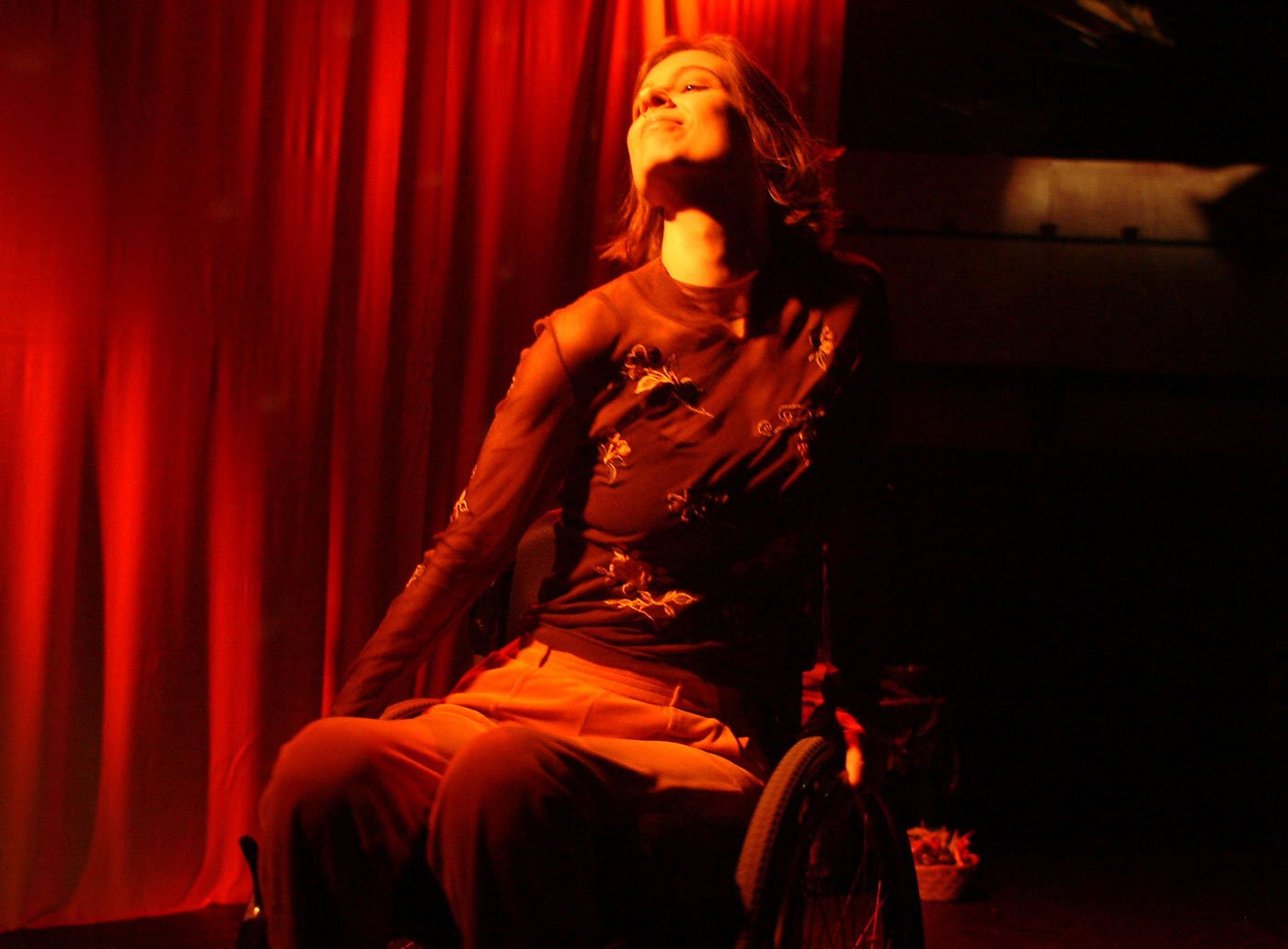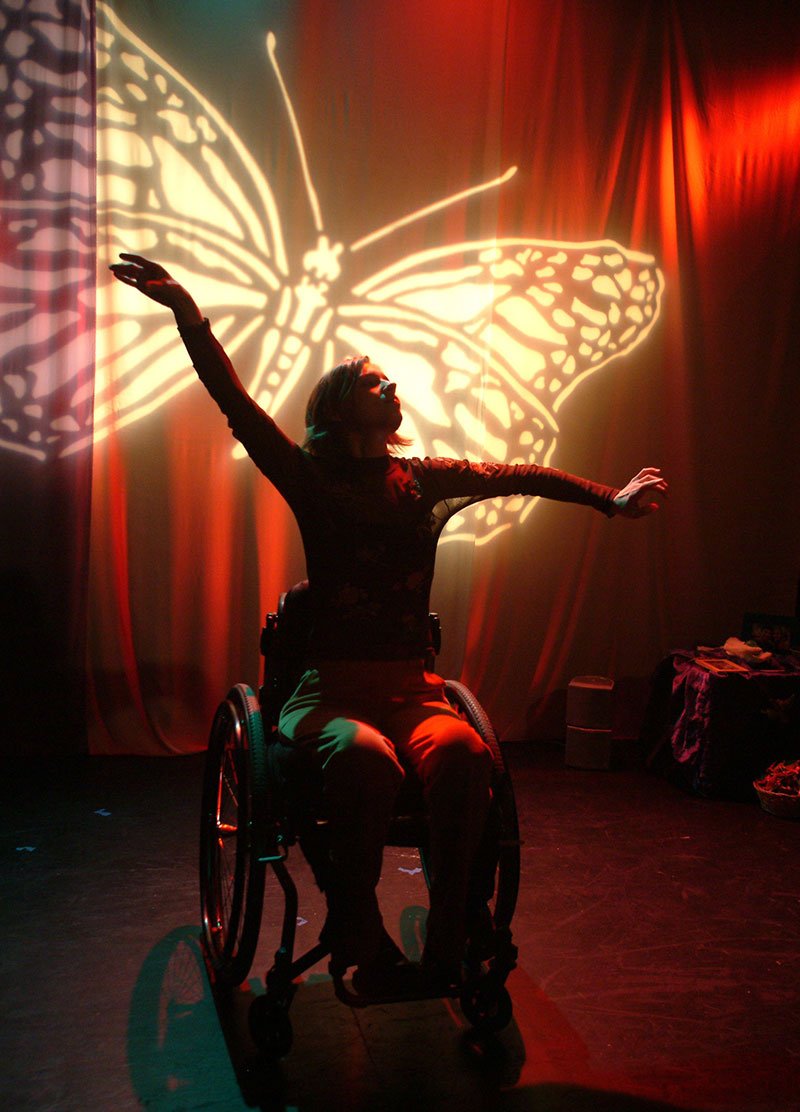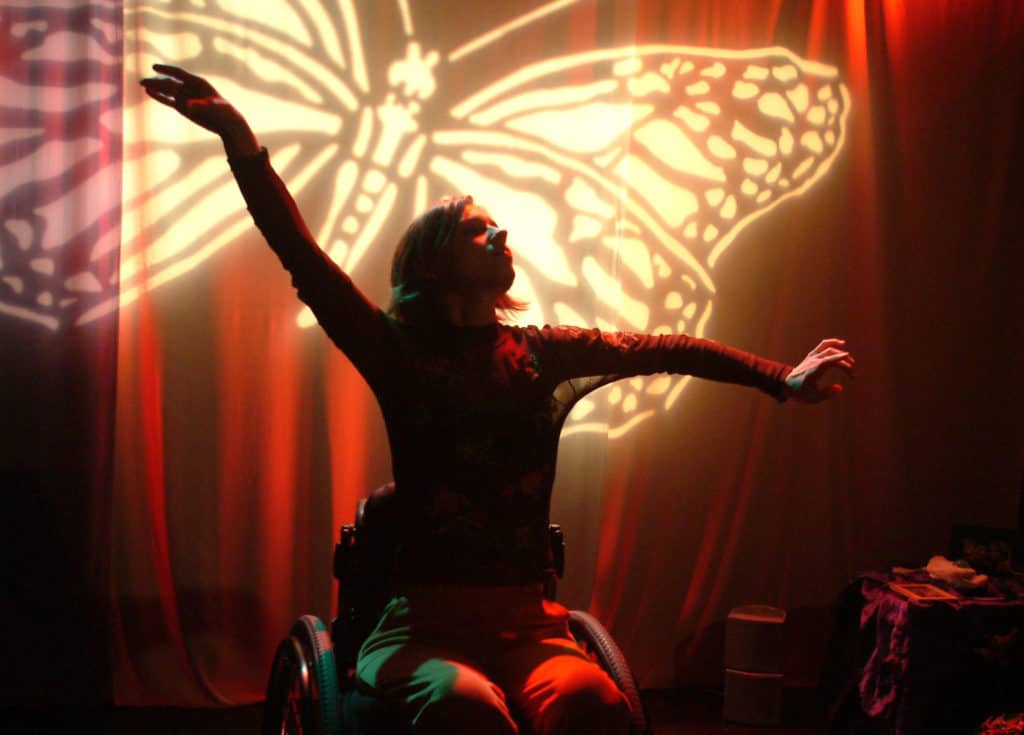The Transformative Power of “Caterpillar Soup” (Part 2 of 2)
By Lyena Strelkoff
• 4 minute read
How NPN and Vermont’s Sandglass Theater helped Lyena Strelkoff share her healing journey

In 2008, NPN and Sandglass Theater in Putney, Vermont, welcomed artist and performer Lyena Strelkoff for a one-week residency where she shared “Caterpillar Soup,” an autobiographical work about her journey to wholeness after a fall in 2002 paralyzed the former dancer.
NPN asked both the Sandglass Theater and Lyena Strelkoff to share their experiences during this week-long residency. Below is the perspective of Lyena Strelkoff, the artist behind “Caterpillar Soup.” Click here for the perspective of Leslie Turpin, managing director of Sandglass Theater.
(The following has been edited for length and clarity.)
In her own words: Artist Lyena Strelkoff
I created “Caterpillar Soup” in 2004 intending to workshop it at a small theater in my area. When its scheduled three weekends turned into six months, I realized I’d hit a nerve. “Caterpillar Soup” immediately began touring modestly but didn’t grow much over the next four years.
Coming into the residency at Sandglass, I was aching to stretch. I wanted to bring something artistically new to the production and give it some encouragement to expand. I also wanted to maximize the potential of the community activities. In the prior few years, I’d offered a lot of workshops in conjunction with performances and found those experiences to be extremely rewarding, but I sensed that they could be even more productive and satisfying both for me and participants. Between the show and the workshops, I wanted to make a deep impression on this community, one that would have a lasting, positive impact.
As far as the workshops, the opportunity of (many!) rich conversations with Leslie months prior to the residency really inspired me. In them, we mined my experience as both an artist and educator, Leslie’s deep familiarity with her community, and our mutual inspiration. We were constantly thinking of new ways I could serve the community: specific points of focus, material I felt competent and highly interested to present, particular audiences that might benefit. We talked on the phone several times and in between, shot off e-mails with new ideas.
Her deep interest in what I might be moved to present was highly motivating, and her thorough familiarity with her community (and willingness to talk about it) empowered me to become really specific. As we got closer to the residency, I constructed excerpts that would speak to the particular audience or theme of a workshop and sought to develop workshop elements that were equally targeted.
In the case of the New England Youth Theater workshop, I’d never worked with people with developmental disabilities but was already contracted to do it again several months after my residency. So it was a great opportunity to reach out to folks far more experienced than I at NEYT for some guidance.
Ultimately, I think it was the combination of mutual engagement and inspiration from both me and Sandglass that made it possible to offer very high quality experiences that were poignantly meaningful to those we served. And to me. The activities we planned encouraged me to share my life experience, my perspective and my wisdom. I had the chance to offer not only my artistry but for whatever it was worth, my humanity.
The influence of location on a performance
As for the production, prior to arriving I rehearsed with the intention of finding new nuances in the characterizations and new, meaningful stage business. Then we set foot (or in my case, wheel) in the wooden, former stable that is Sandglass Theater and were so inspired, we re-staged certain sections of the show to capitalize on the ambiance.
“Caterpillar Soup” details a healing journey in such detail that viewing it can be a healing journey for audience members. We wanted to accent this function by highlighting the ritual nature of certain parts of the story and, at the same time, exploit the inherent theatricality of the space.

The staff at Sandglass was extremely supportive of the artistic risks I wanted to take. They gave us unfettered access to the theater, mobilized to find (even create) simple props and set pieces that our new vision required, and offered feedback and creative ideas. They were attentive (though not stifling) and worked tirelessly to empower my inspiration. They are, themselves, artists and that facilitated inspiring, instructive, and thoroughly nourishing interactions. It didn’t even matter that the theater wasn’t entirely accessible. They’d prepared me well before my arrival and the quality of our interaction, combined with their sensitivity to issues of accessibility, diminished significantly the impact of any inconvenience. More than many, this residency was very collaborative and so offered superb support for my artistry.
My art exists to create opportunities for healing and transformation. I think, in fact, that’s why I exist. Sandglass Theater did a fantastic job utilizing the best of what I wanted to offer as an artist, an educator, and a person. Not only was the impact on the community clearly positive, but so was the impact on me. This residency captured potential I felt certain existed but had never had quite the right support to manifest, and in its reflection, I see that the potential was greater than I ever imagined. I can’t wait to go back.
Addendum: With the help of a Community Fund Grant from NPN, in 2011 Sandglass Theater brought Lyena Strelkoff back for a two-week residency to workshop and perform “Caterpillar Soup” for even more communities.
